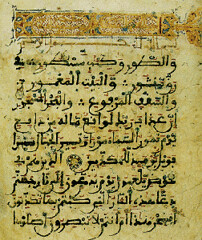*points taken from a khutbah by Sh. Ahmad bin Muhammad bin 'Abdullaah al-Hawwaash/
Imaam and Khateeb, Al-Jaami'a Al-Kabeer, Khamees Mushayt
(Before I start with the actual khutbah, I'd like to mention something about the character of the shaykh's masjid -- it's bang in the centre of a very busy souq surrounded by all kinds of big and small shops. Unlike other masaajid, it's not very opulent (no foot-deep plush carpets, no crystal chandeliers, no ACs on full-blast); it has separate entrances for men and women and a very large women's section and there's a flight of some steps before the entrance to the women's section.
On Friday, you'll have women coming in with little sprigs of rayhaan (scented herbs) and mint and twigs of miswaak to hand around the masjid...just for the sheer ajr and pleasure of sharing something with others. There are copies of the Qur'aan in old-fashioned niches in the wall, boxes of tissues and cups of bottled water provided for free by worshippers. Some of the women are regulars -- the women in the front rows who attend almost every Friday prayer there...and possibly stay for the evening dars (lecture); others whose presence is incidental. One elderly sister I've noticed in particular, stays back after the prayer and cleans up the entire musalla, picking up bits of tissue and carelessly discarded water cups and bottles, making sure that the entire praying space is clean before she leaves.
After ending the khutbah, the shaykh makes it a point to remind people to turn off their mobile phones in case they've been left on, before getting ready for the 'ittsaal al akbar' (the highest communication) with the Lord of the Worlds. It's actually such a small gesture, but it makes a big difference to the quality of concentration and focus during the prayer.
I'd really like to write about the nature of the prayer led by the Imaam, but in the past he has been very upset with people who prayed with him and talked about the prayer in a manner of eulogy...he specifically mentioned it one Friday and warned against praising someone in matters of deen without knowledge -- and who knows the inner states of hearts except Allaah, The All-Knower?
Suffice to say that he strives to follow the Sunnah of prayer of the Prophetصلىالله عليه وسلم to the best of his ability, with Ihsaan (excellence).)
------
*One of the first words that the Prophet, صلىالله عليه وسلم is reported to have said on entering Madeenah were: "O people! Spread Salaam (glad tidings/greetings of peace), feed (the poor and needy), maintain the ties of the wombs, and offer prayer when the people are normally asleep, and (thus) enter Paradise in peace."
What is the meaning of spreading salaam? Is it merely to say the words: As-salaamu'alaykum (peace be upon you) to one another by way of greeting? Or does it have a deeper meaning?
Muslims who understand the true meaning of afshus-salaam (spreading salaam) will try and keep others secure from their sharr (evil) by thought, word and deed.
That means: they will not act on the evil suggestions of their Self, by not thinking evil thoughts about others,such as harbouring envy/jealousy/enmity/suspicion/unlawful thoughts of a sexual nature. They will safeguard the tongue and stop themselves from speaking evil like lies/slander/gossip/backbiting/vain talk about others. They will control their bodies and restrain themselves from physically harming others -- by way of physical assault or taking an innocent life that is forbidden by Allaah; or by indulging in unlawful physical contact.
If a Muslim does all this, he has actually extended salaam to others.
*salaam is a basic right of one Muslim upon another
The Prophet صلىالله عليه وسلم said: "When one of you meets his brother, he should salute him by sending blessings of peace upon him" (Hadeeth transmitted by Abu-Daawood)
In another hadeeth, Abu Hurayrah quotes the Prophet صلىالله عليه وسلم as saying: “A Muslim has a right against his fellow Muslim in six ways.” Asked what were these, the Prophet صلىالله عليه وسلم said: “When you meet him, greet him; if he invites you, accept his invitation; if he seeks your advice, give him an honest and sincere advice; if he sneezes and praises Allaah, bless him; if he falls ill, visit him; and if he dies, attend his funeral.” (Narrated by Al-Bukhaari and Muslim).
It is also the right of a Muslim that his greetings be returned in a better manner: “When a greeting is offered to you, answer it with an even better greeting, or (at least) with its like. Allaah keeps count of all things.” (4: 86).
The better greeting and reply are illustrated in the following Hadeeth. Umar reports that he was riding with Abu Bakr on one mount. When they passed by people, Abu Bakr greeted them saying: “Assalamu 'alaykum” and they replied: “Wa 'alaykum assalam wa rahmatullaah.” Or he may greet them saying: “Assalamu 'alaykum wa rahmatullaah,” for which their reply was: “Wa 'alaykum assalam wa rahmatullaah wa barakaatuh.” Abu Bakr commented: “Today, people have gained much more than us.’” (Related by al-Bukhaari in Al-Adab Al-Mufrad)
The Prophetصلىالله عليه وسلم called returning a fellow Muslim's greeting one of the "rights of the road" and called the person who initiates greeting a fellow Muslim after an altercation/disagreement has occurred between them, the better Muslim. "It is not lawful for a Muslim to desert (not to speak to) his brother Muslim for more than three days while meeting, one turns his face to one side and the other turns his face to the other side. Lo! The better of the two is the one who starts greeting the other". (Saheeh Al-Bukhaari)
*people who set out to spread the opposite of salaam
There are people who deliberately (or unknowingly) set out to spread the opposite of salaam. They create discord between husbands and wives, parents and children; among extended families, neighbours and communities, among nations and the Ummah.
Their situation is like the ones mentioned in the Qur'aan: "And when it is said to them: 'Do not cause discord/corruption on earth', they say: 'Rather, we are but reformers'. Unquestionably, it is they who spread discord/corruption; but they do not perceive it." (2: 11-12)
Has not the time come to take stock of ourselves? Are we among the ones who spread salaam or do the opposite? Do we not know that Allaah does not love the mufsideen (the people who spread discord/corruption)? Then, let us make sincere repentance to Allaah and return to that which is pleasing to Him and not persist in disobedience and spreading discord/corruption on the earth.
*salaam is the greeting of the blessed people of Jannah
The people of Jannah will be received with the words of Salaam: وَيُلَقَّوْنَ فِيهَا تَحِيَّةً وَسَلَاماً
( سورة الفرقان , Al-Furqan, Chapter #25, Verse #75)
They will be greeted with the words: Salaamun 'Alaykum! Tibtum (the translation of which means: "Peace be upon you! You have been purified!"(39:73)
Indeed, the greetings of the people of Jannah amongst themselves will be salaam :
وَتَحِيَّتُهُمْ فِيهَا سَلاَمٌ وَآخِرُ دَعْوَاهُمْ أَنِ الْحَمْدُ لِلّهِ رَبِّ الْعَالَمِينَ
the translation of which means: And their greetings therein will be Salaam and the culmination of their request will be: Al-Hamdu Lillaahi Rabbil-Aalameen (All Praises belongs to Allaah, the Lord of the Worlds( سورة يونس , Yunus, Chapter #10, Verse #10)
This is because Allaah will have purified their hearts of all rancour and ill-feeling and they will be at peace with themselves and each other.
*Allaah is the ultimate source of salaam
In the duaa after saying salaam in salah, we affirm that Allaah is As-Salaam and from Him is all peace. The state of discord around us -- in our Ummah and in our own lives -- is because of the great distance from the Source of all peace. We hear increasing reports of the spread of mental, psychological and stress disorders because people lack mental peace. The cure for that is to approach the original Source of peace and try to attain nearness to Him through repentance, prayer and righteous deeds.
-------------
(I've looked up and added detailed references where I could. Please bear in mind that these are *points* from the khutbah and not the actual khutbah itself. I'd be grateful for corrections/recommendations if you spot any mistakes in the references/translation. I pray this will be of immense benefit to the readers...please keep us in your prayers!)
Labels: Friday khutbahs, reminders, timeless words/wisdom









![36_2_25[1]](http://static.flickr.com/53/152362417_eb6e804f5b_o.gif)